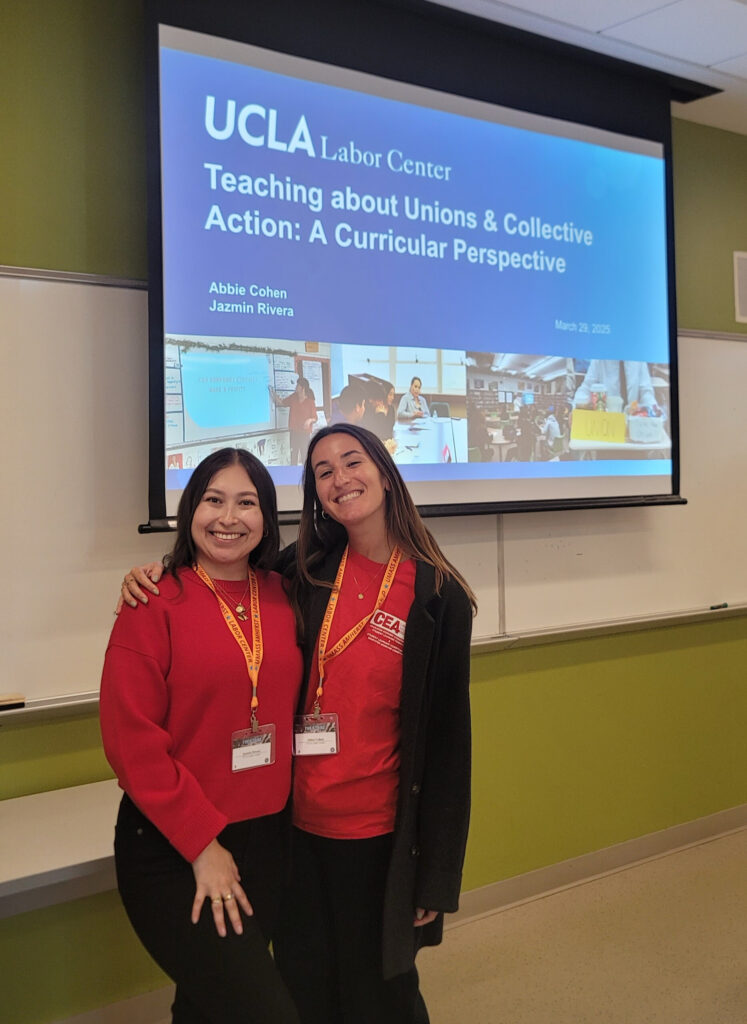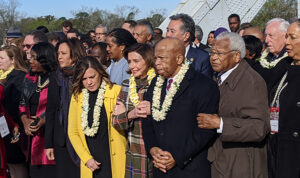
Por: Abbie Cohen, estudiante de posgrado de investigación del Centro Laboral de la UCLA y doctora por la Facultad de Educación y Estudios de la Información de la UCLA.
Los días 28 y 29 de marzo de 2025, Jazmin Rivera, especialista en educación comunitaria del Centro Laboral de la UCLA, y Abbie Cohen, estudiante de posgrado de investigación del Centro Laboral de la UCLA, volaron a través del país para asistir a "La Huelga: Building Workers' Power Todayuna conferencia celebrada en la Universidad de Massachusetts, Amherst. El momento de la conferencia era crítico, ya que a principios de ese mismo mes, el Presidente Donald J. Trump despidió ilegalmente a la presidenta de la Junta Nacional de Relaciones Laborales (NLRB), Gwynne Wilcox, la única mujer negra que ha formado parte de la NLRB.
La reunión, de un día y medio de duración, ofreció momentos de esperanza y acción colectiva, brindando a los trabajadores la oportunidad de organizarse y compartir historias de éxitos y retos. La conferencia comenzó con un apasionado discurso de Sara Nelson, presidenta internacional de la Asociación de Auxiliares de Vuelo, seguido de una sesión plenaria en la que se destacaron las huelgas de Chile, Suecia y el norte de California.
Al día siguiente se celebraron cuatro sesiones simultáneas para que investigadores, trabajadores, profesores y activistas aprendieran juntos sobre los derechos de los trabajadores. Cohen y Rivera dirigieron una sesión interactiva titulada "Teaching about Unions & Collective Action: Una perspectiva curricular", en la que se presentó a los asistentes la legislación AB 800 de Californiaque, a partir de 2024, exige que todas las escuelas secundarias de California impartan un plan de estudios de una semana de duración sobre los derechos de los trabajadores.
"Con Trump en la presidencia y nuestras comunidades afectadas por las redadas del ICE, es importante no solo conocer tus derechos, sino también cómo se pueden aplicar", dijo Rimon, participante de la Red del Sur de Asia (SAN). "Después de ver cómo en Chicago, muchas de las personas lucharon contra las redadas de ICE, te hace saber que todas las comunidades deberían tener esta información sobre la promulgación de sus derechos".
Jazmin y Abbie invitaron a los 20 participantes adultos en la conferencia a imaginarse de nuevo en su clase de historia de Estados Unidos en el instituto y les guiaron a través de este ciclo de aprendizaje de cinco días. El plan de estudios lleva a los estudiantes a examinar críticamente por qué los trabajadores tienen derechos y qué pueden hacer cuando esos derechos son violados. Al experimentar el plan de estudios por sí mismos, los asistentes a la conferencia obtuvieron información de primera mano sobre las formas en que podrían impartir la formación en sus propias organizaciones. Los participantes señalaron que los materiales del plan de estudios, incluido el módulo Conoce tus derechos les habrían beneficiado a ellos mismos o a los alumnos a los que enseñan en la actualidad.
A continuación, Cohen y Rivera presentaron al grupo "Starcups: Simulación de elecciones a la Junta Nacional de Relaciones Laborales Simulation" (Simulación de elecciones a la Junta Nacional de Relaciones Laborales), un plan de estudios interactivo basado en los esfuerzos de sindicalización que se están llevando a cabo en Starbucks de todo el país. El plan de estudios fue desarrollado conjuntamente por Nicolle Fefferman, del Proyecto Educativo para Jóvenes Trabajadores, y el personal de la Iniciativa para Jóvenes Trabajadores del Centro Laboral de la UCLA. del Centro Laboral de la UCLA. En estas lecciones, se pide a los estudiantes que representen a miembros del personal no sindicados, a la dirección, a un agente de la NLRB y a miembros de la comunidad. De este modo, los jóvenes trabajadores experimentan y practican las distintas formas en que las partes interesadas viven el entorno laboral.
El dúo de formación del Centro Laboral de UCLA terminó la sesión con un debate sobre cómo estos planes de estudios pueden influir en los entornos docentes de los asistentes. Un profesor universitario compartió la forma en que quería adaptar el plan de estudios StarCups en su curso de estudios laborales, y un profesor de escuela pública y organizador sindical describió cómo el documento "KYR" sería fundamental para sus estudiantes trabajadores en Massachusetts. Un organizador expresó su deseo de que leyes como la AB 800 se apliquen en más estados del país, y un estudiante de posgrado en estudios laborales compartió cómo este modelo de enseñanza de los derechos laborales y la historia puede preparar a los estudiantes para carreras como activistas, defensores, responsables políticos y miembros bien equipados del movimiento obrero.



